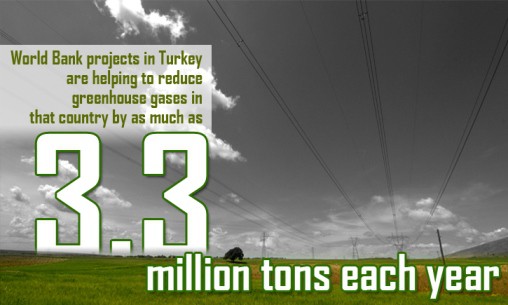
This article was adapted from Yesilist.com
Turkey is constantly being nudged to get on board with the worldwide trend to reduce emissions and pursue renewable energy options, although the country continues to act slowly. In March 2011, former US vice-president Al Gore spoke at the “Leaders of Change” summit in Istanbul. Gore revealed that despite Turkey’s role of regional leader, it has yet to take advantage of its potential in setting a renewable energy precedent. Policies run thin and old habits are putting the country at risk of droughts and desertification, which has already begun to affect Turkey.
Environmental stakes run as high as emissions
With some 1.6 million cars on Istanbul’s roads and 640 being registered each day, it is no wonder Turkey is beginning to emit increasingly more carbon into the atmosphere. Turkey’s greenhouse gas emissions doubled between 1990 and 2009 – from 187 million to 370 million tons of CO2 equivalent. In 1980, there were 43 cars per 1,000 residents. By 2006, this figure had reached 134 million tons. And by 2020, it is expected to hit a whopping 266 million.
Greenhouse gas emissions in Europe have been declining since 1990, which has shed further light on Turkey and its lack of initiative to deal with its carbon load, which has only been rising, and at staggering rates. The government has been relatively silent in setting up effective emissions policies. While Turkey did indeed ratify the Kyoto Protocol in 2009, it was one of the last countries to do so and was not bound to pre-2012 Kyoto targets since it was not a member of the UN Framework Convention on Climate Change when the protocol was originally implemented.
Turkey is powered for the most part by plants running on fossil fuels, and these plants continue to be built. Hydro-power plants comprise about 20% of Turkey’s installed capacity, but have been regarded as wasteful and damaging to surrounding ecosystems by environmental groups and locals. Meanwhile, Turkey is hoping to build five nuclear plants by 2030, for which their proximity to active fault lines have been a topic of concern and subsequent opposition.
A new market for fuel-efficiency

It would be foolish, however, to disregard the strides that are being taken. In July 2011, the Technological Research Council of Turkey (TÜBİTAK) hosted its very first Alternative Energy Vehicle Races in Izmir. There, 38 teams gathered to race their solar cars and 20 teams entered the hydrogen car competition. The event’s success led Turkey’s Ministry for Science, Industry and Technology Nihat Ergün to announce the government’s readiness to increase its focus and investments on renewable vehicles.
In 2013, the Turkish Finance Ministry announced its plans to emulate German and British standards by paralleling vehicle tax rates with emissions rates. Essentially, taxes will hinge on the amount of pollution emitted by a vehicle.
Fuel-efficient cars present a new market to explore in Turkey. Their costs run higher than consumers are willing to spend, but given the increase in gasoline and diesel prices and the introduction of vehicle tax rates that are based on emissions, fuel-efficient cars pose as an area of marketing potential. In 2011, the world’s first manual-gear hybrid, the Honda CR-Z, arrived in Turkey at a cost of $30,000.
Real, significant change will require a revamp of Istanbul and other cities’ weak traffic infrastructure in order to encourage the population to use the metro system, bike or walk instead of hopping into a car or bus.
Regarding renewables
Meanwhile, Turkey is awarding an additional 600 MW of solar energy by the end of 2013, adding to the country’s goal of reaching a cumulative capacity of 4 GW of solar energy by 2017. This is a leap from the current capacity of some 7 MW. Solar projects will replace many of Turkey’s reliance on energy imports. With electricity consumption having increased by approximately 8% per year over the past decade, Turkey is ranked as the third-largest electricity consumer in the Middle East and will need to explore its renewable energy options in order to fulfill current and expected demand.
These strides, however, are few and far between. Renewable energy will require a more holistic backbone that can effectively measure and report greenhouse gas emissions as well as hold all Turkish sectors accountable to the broader, country-wide cause of cutting the carbon footprint. Sweeping policy changes should drive such change and propel Turkey towards a future of increased renewable energy sources and a reduced reliance on fossil fuels, inefficient practices and energy imports. Turkey will be a cleaner, more forward-thinking nation because of it.
Photo Credit: Pure3d







